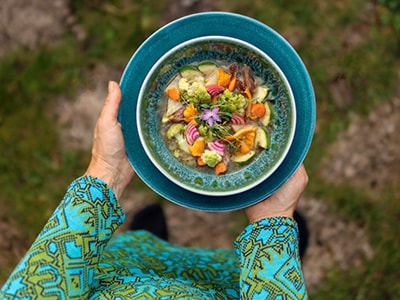
If you are suffering from chronic pain, diet plays an important role in relieving symptoms. An anti-inflammatory diet that is rich in fresh fruits and vegetables, fatty fish, antioxidants, and fiber is an excellent choice. Avoid processed foods, refined sugar, saturated and trans fats, and conventional dairy as they make inflammation much worse.
Supporting your microbiome is also crucial for managing pain. Why?
Recent studies have found that the gut microbiota plays a significant role in pain signaling — including the pain involved with inflammation, headaches, neuropathy, and visceral areas such as the abdomen, chest, intestines, and pelvis. Eating a prebiotic and probiotic rich diet that includes Jerusalem artichokes, flaxseed, chia seed, sauerkraut, kimchi, coconut kefir, tempeh, and fermented pickles is helpful.
Recent studies have found that the gut microbiota plays a significant role in pain signaling — including the pain involved with inflammation, headaches, neuropathy, and visceral areas such as the abdomen, chest, intestines, and pelvis. Eating a prebiotic and probiotic rich diet that includes Jerusalem artichokes, flaxseed, chia seed, sauerkraut, kimchi, coconut kefir, tempeh, and fermented pickles is helpful.
Chiropractic care, acupuncture, light exercise and stretching, stress management, and quality sleep are all important for managing chronic pain. Oftentimes, sleep is disrupted because of pain. Taking an Epsom salt bath (magnesium sulfate) and having a regular sleep-promoting bedtime routine can help.
Getting enough vitamins and minerals is also essential for pain management. Focus on vitamins B-12, C, and D, along with fish oil, magnesium, and probiotics.